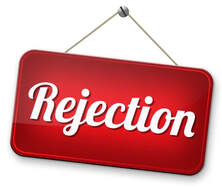|
There's a point in every successful poem where the reader becomes emotionally entangled. We might call it the "heart-point" of a poem. It's that moment when emotional response begins. It can happen with a title, like "Tears, Idle Tears" or "Do not go gentle into that good night," or it can come at the end, as in Sylvia Plath's, "Strumpet Song." The feeling can be sadness, anger, joy, wonder, guilt, or any other flavor you choose. Whatever emotion you're going for, the heart-point in your poem matters. Let's take a look at a really simple two-line poem and see if we can find the heart-point. The poem is the teacher's favorite, "In a Station of the Metro,” by Ezra Pound, first published in 1913. In a Station of the Metro The apparition of these faces in the crowd: Petals on a wet, black bough. The heart-point isn't in the setting-making, technical-toned title. It isn't even in the word "apparition," although the word is pivotal to the poem's emotional impact. It's actually in the word "petals." And the emotion that starts there is hope. It's impossible for most of us to think of Spring or flowers without feeling at least a wisp of hope. The reader's hope, however frail, is engaged with this word. What comes next is a soft-landing, which Pound brazenly accomplishes by doubling down on traditionally banal adjectives. Remove the word "wet" and you have a crash landing. The word "black" is an intentional mortal shadow, but its threat is checked by the Holy Word "wet" which, in addition to its obvious sexual and religious connections, also has a lot to do with the chemical and biological foundations of life itself. So, in placing the heart point where he did, Pound captures the feeling of sudden realization that is the entire purpose of the poem. His satori-in-a-bottle finishes with lightning because you feel hope-fear-hope in such rapid succession. The heart-point of a poem is a vital element that many poets overlook, or underestimate. But the best poets not only know how to use it; they know how to use it as a foundation for brilliance. If you'd like some feedback for your poetry or a bit of help polishing your words, just click one of the buttons below. Or email @ [email protected] Archives May 2024
0 Comments
One of the sad realities of poetry is that virtually every poem misses more readers than it hits. Even famous poems, like "The Raven" or "Nothing Gold Can Stay," impress only a fraction of the readers who encounter them. When it comes to poems posted online, or poems published in journals, the odds of engaging the average reader are steep. Most readers don't finish poems, and even when they do read them all the way to the last line (without skipping), there's usually a point of disengagement before the last line falls. They may technically read all the way to the end, but their thoughts are on who did or didn't text back, or how the cat's doing, as they're reading. Way back in the candle-lit nineteenth century, Mr. Poe insisted that the longest any poem could be and still hold a reader's attention was 100 lines. That was a century before the Internet and social media. These days, many readers jump right from the title to the last line. This seems cruel to poets, and in some ways, it is a cruel reality, but it simply reflects the fact that, for most people, thirty-seconds of attention is a lot. Even from someone who's blood-related to you, or personally mentioned in your poem. A part of every reader is waiting for your poem to fail. It's a form of confirmation bias, which means the default assumption is: if you were any good, you'd already be famous. Since you're not, you must be bad. Then if anything is off in the poem, it confirms this initial idea. And by "anything" I mean grammar errors, typos, cliches, weak images, dull language, or glitchy rhythm and meter. The instant a reader (or editor) spots something "off" in your poem, they're going to scroll away, swipe away, or flip the page. They won't feel cheated, because poems are almost always free, but they'll stand confident in the idea that your work is average or below average and all they'll likely remember is the part that failed. AI can't (yet) help you with this issue. People don't read AI's poems, either. So what can you do? Two things. The first is to accept the reality of confirmation bias. The second is to eliminate all obvious errors in your poems. This means putting more time into each poem. It means setting new poems aside for a while and editing and polishing them after you've had a chance to get some distance. There's simply no other way. To be honest, this is very good news. There seems to be something in human nature that shrugs off the notion of "toss away" poetry, or disposable poems. I'm not saying that all poems should, be weighty or profound, but I think it's a very good thing that some part of us still expects something special each time we read a new poem. There's no shame in wanting artistry from an artist! So, the way to stop the scroll is to stop your own scroll and spend more time on each of your poems to be sure you don't provide convenient escape routes for readers. If you'd like some feedback for your poetry or a bit of help polishing your words, just click one of the buttons below. Or email @ [email protected] Categories All As I've mentioned many times, the best poems smack you in the nose with a bit of surprise. Some poems, like Allen Ginsberg's, "Howl," or Charles Bukowski's, "Girl on the Escalator," seem built almost completely out of surprise left hooks meant to knock you out of your normal senses. Other poems, like Plath's, "Daddy," or Sexton's, "You, Doctor Martin," turn the surprise volume up to eleven before they even really get going, just by striking an attitude of power from what society expects should be a victim's perspective. But poems don't have to be revolutionary or controversial to surprise. A single line, or even a single word, can suffice. For example, May Swenson's poem, "All That Time," burns straight into memory mostly due to her brilliant use of gender pronouns. By attributing "he" and "her" to two trees, and personifying their entangled growth, she captures a powerful poetic vision that is poignant and perpetually surprising. In fact, it's basically impossible to write a poem that doesn't do something new. Like snowflakes, poems are infinitely unique. Each poem is a one-of-a-kind "fingerprint" that speaks to a specific creative inspiration. Every time you write a poem, even when the poem fails, you make something fresh. It may be a Big Discovery that you proudly recognize, like uncovering a new theme or inventing a new stanza. It may be something you never even consciously notice, like using a perfectly placed slant-rhyme or dactyl. The point is: part of what draws poets back to writing again and again is the sense of discovery. And part of what draws readers back to your poems is the promise of surprise. The challenge is to integrate surprise into your poetry in way that draws attention, but also rings true. Diane Seuss's poem, "Glosa," is a perfect example of how to do this. Take a look at it by clicking the image above. The poem turns on the lines: ...Caligula, who cut off tongues and fucked his sister. This single punctuation-point of surprise, like a sudden uppercut, defines the entire poem and shatters its otherwise pensive veneer. The scholarly tedium of life and the wildest sense of perversion are combined in these lines to define the poem's theme, but also to wrangle something new with words. The lesson to take away here is to look at your poems like presents, both to yourself and to the reader. Wrap them carefully and make the impact of opening them an experience the reader will never forget. If you'd like some feedback for your poetry or a bit of help polishing your words, just click one of the buttons below. Or email @ [email protected] Categories All First impressions are very important when meeting new people. If you're introduced to someone and you have big pimple on your nose, or happen to be wearing your dingiest clothes, it's likely you'll feel a bit self-conscious. Rumor has it that your shoes are the first thing people notice about you when you meet them. So, today's blog is how to make sure you give your poems good shoes! And I'm not talking about titles or first lines, either, although those are crucial elements. What I'm talking about is the first word of a poem. That's where a poem starts to really walk and maybe even run or dance. But whatever it's going to do, the first word is the cue to action. Let's look at some examples, starting with Emily Dickinson's famous poem, "The Chariot." The word "Because" is a powerful starting point, almost of an equivalent scope to a larger phrase, like: "In the beginning." The first word promises something, and what it promises is: explanation. T.S. Eliot's "The Wasteland" starts off with the hopeful word "April" and then descends straight into Hell. Diane Seuss's poem "Self-Portrait with Sylvia Plath’s Braid," (linked above) starts with the word "Some" and proceeds to carve out a rebellious portrait of individuality. Robert Frost's, "The Road Not Taken" starts with the decision-word: "Two," and this initiates the reader into the poem's theme of choices. I could go on and on, but you get the idea: first words, like first impressions, set expectations and tone. They make moods. And if you get the first word wrong, it's likely the rest of the poem will follow suit. For example, there's a Ted Hughes poem called, "Buzz in the window" that starts with the word, "Buzz." Never mind the useless repetition, the word is so arresting and exciting that it should lead into something spectacular, but instead, the poem continues: "Fly down near the corner..." If you set expectations high with your first word, you have to start delivering fast. So keep that in mind. Hopefully these examples spark some ideas! Meanwhile, if you find these blog-posts useful, please consider buying me a spot of coffee through the link below! I could really use it! You can also donate here: PayPal [email protected] And if you'd like some expert help with editing or polishing your poems, or you just want a bit of feedback, hit the links below. Or email me at [email protected] I look forward to reading your work! Categories All "Full Fathom Five" (linked through Plath's picture above) is the first poem that Sylvia Plath wrote that hints at the paradigm-shattering voice she would develop later, particularly in connection to specific psychological themes. Prior to this poem, Plath's urge to deal with her "daddy" issues expressed itself only through reworkings of fairytale archetypes and, as we saw with "Sonnet to Satan," ironic jabs at authority. This is the poem where everything changed. It is, in effect, Plath's baptism into Confessionalism, although Confessionalism had not yet been invented, and the poem stops well short of being authentically confessional. The opening lines of this Shakespearian titled poem make it clear that Plath, like Hamlet, is no stranger to her father's ghost: Old man, you surface seldom, Then you come in with then tide's coming The connection between memories of her father, the sea, and the moon (tides) is foundational to Plath's poetry. You can't fully understand Plath's work if you are blind to this essential starting point. Plath has received a wound (her father's death) and she turns back to childhood memories of the sea to console her. But instead of lolling around on the sands turning angelic bronze under the Boston sun, the sea is calling her to not only get wet, but to drown. As Plath sinks into the sea in the poem, she falls through the ghost of her father who seems to dissolve before her as she drowns. The sea, the psyche, and poetry are fused in this space where all solid things start to show cracks, and -- in fact, threaten to become nothing more than ghosts. Of great interest here is that "Full Fathom Five" is only one of two poems she wrote that day. The other "Lorelei" describes her complete drowning as she suicides into the sea to escape the patriarchal world of solids. In "Full Fathom Five" Plath cries out for her father's "shelled bed" and in "Lorelei" she begs the sirens to "ferry" her to her death. These poems, written back to back while Plath read a book by Jacques Cousteau, express violent, contradictory desires for life, for death, for love, for masculinity, femininity, for God, for nature. The key thing to take away from this is that these are starting points for Plath. She is just barely creaking the door open to her genius. The dissolving power of the imagination is a starting point, not an end. The next stage, a la alchemy, is to fuse things back into new forms. Another important poem, "Mussel Hunter at Rock Harbor" was written by Plath the next day and this poem became her first New Yorker poem. This one is the "capstone" of Plath's juvenilia. It's the poem all the others were building to and it's also her forever goodbye to the "Ocean 12-12W " world of her childhood. A successful fusion of the past. Or should have been. As we'll see later, Plath's paradisal past continued to haunt her to the very end. So a trilogy of sea-poems written in two days that foreshadow a lot of what would later form into Plath's mature work. All three are well worth reading and show all of the classic Plath riffs with diction, figurative language, and archetypes. I'd talk about them more but the blog would get too long. Next Monday, we'll talk about Plath's poem "Medallion" one of the first poems that shows the fracturing of her relationship with and marriage to the poet Ted Hughes. Tally Poems Written: 314 Submissions: 51 Rejections: 23 (13 tiered) Acceptances: 0 Poem written today: "Cherry Finder" If you need a hand revising and polishing: 1) Have me do it for you! Click the "Poem Polisher" button below. I've helped lots of poets. 2) Use my 7 Secrets of Poetry pdf as a guide for revision. Categories All Poems have natural elements that stay the same no matter what you do. The words move from left to right and the lines go from top to bottom. Of course you can change this and make any kind of poem you want, one that goes backward, forward, or makes alphabet soup on the page or screen. But, for the most part, the basic elements of a poem stay the same each time you start to create a new work.
Everyone knows that the last word of each line gets special emphasis by the reader, no matter what enjambment you use. Everyone also knows that first lines and last lines enjoy a greater punch just by being there. These are basic elements that every poet learns to use, almost by instinct. But what about other "elemental" elements of a poem? Are there aspects that get less attention than first words and last lines, but are just as powerful? In fact, there are quite a number of these basic elements that you can use to empower your poems. I'm only going to talk about one in this post and that's the downward motion of a poem. Virtually every poem in English moves from the top to bottom and you can (and should) use this natural motion to you advantage. One perfect example of this is the poem I talked about in yesterday's post, Plath's "Black Rook in Rainy Weather." The poem starts with the speaker looking up in a hopeful way, and then, as the lines fall down, the speaker looks inward to doubt and hesitation, sweeping back up (slightly) at the close to find a sprig of hope. Another really short poem that uses the downward motion of a poem well is: "We Real Cool" by Gwendolyn Brooks, with the lines literally burying the guys in the poem and leaving a tombstone to them. Another great example is "Apple Picking" by Robert Frost -- where the poem becomes a ladder to memory and dreams. And yet another , rather spectacular, example is Hart Crane's "Atlantis." That one's dynamiter though so be very careful! And last, but certainly not least, I'd like to mention Anne Sexton's poem, "The Ambition Bird" which is about the struggle to contain and release artistic ambition. You can see how she uses the downward climb of the poem yourself -- it's heart wrenching. The point is: the downward climb of a poem is there whether you like it or not; it's part of your poem's expression whether you want it or not. So your best bet is to let the natural gravity of a poem, it's innate fall from imagination to "paper" be your inspiration and your guide. Meanwhile, if you'd like some help with editing or polishing your poems, or you just want some feedback for them, reach out to me @ [email protected] [email protected] or use one of the buttons below. Also, check out my 7 Secrets of Poetry guide available now! Plath's "Black Rook in Rainy Weather" is a brilliant poem that marks the beginning of her inward journey. It's one of her finest early poems and, like "Sonnet to Satan," which we looked at in the last post, this poem is deeply psychological. There's a lot I could say about this poem's relationship to Poe's "The Raven," to Shakespeare, to Ted Hughes's fascination with crows, and to Plath's superstitiously scientific view of nature. But instead, I'm going to confine myself to just three thoughts about the poem. The first is that, from the opening lines, Plath looks "out" in order to gaze "in." I use the quotes there because the whole point of the poem is that there is no separation between the inner world of emotion and the outer world of nature, but that the illusion of separation is what causes emptiness and mortal fear. On the stiff twig up there Hunches a wet black rook The word "up" establishes a searching, religious feeling. As the speaker looks up, the poem turns inward at the same time to contemplation of existence. This brings us to the second insight I want to share, which is that Plath introduces nature first and then steps, full of questions, into the scene. This is a very subtle detail, but the whole energy of the poem turns on it. Had Plath introduced "I" before she described the upward gaze to the rook, the poem would have been only half as successful. By stepping upward into nature full of questions -- the poem soars from its opening, while the bird itself refuses to move, a la Poe's raven. The bird is still, but the speaker of the poem is a whirl of psychological energy. This brings me to the final insight I want to offer: that the image of the bird, still and at peace in the tree is the answer to the speaker's mental and emotional angst. The speaker is looking for a fiery omen, but nature's message is simply to be in harmony. This same potential connection with nature continues through all of Plath's work. You can read the full poem by clicking Plath's picture above. I hope you'll read or reread it, and then come back and tell me what you think. Next Monday we'll talk about Plath's incredible poem, "Full Fathom Five" which is an early poem that tackles her father issues square on. Meanwhile, if you'd like some help editing or polishing your poetry, contact me @ [email protected] or [email protected] or click one of the button-links below. Categories All Plath's early work, prior to 1956, gives very little indication of the dynamic poetic genius she would later unleash on the world. That said, there's one poem, "Sonnet to Satan," that really stands out and shows just about all of the elements that Plath would ultimately use to construct masterpieces.
There's a lot going on in this poem, but the first and most obvious element is, of course: surprise. A general rule of thumb with Plath is, if the poem doesn't start with a surprise, it probably won't be a very good Plath poem. Most, if not all, of her best poems like "Daddy," "Ariel," "Lady Lazarus," "Candles," and the like are based on hitting the reader where they least expect it. Here, in her college years, Plath decided to shock the grown-ups by writing a poem to Lucifer. What's even more shocking is she chose to do so in a sonnet. A demanding, exacting form that moves fast and demands facing contradictions, and immersing in often violently contrasting emotions. In other words, the definition of a Plath poem. Note two additional fingerprints: an almost-rigid attention to meter and a bold identification with myth. These are elements that Plath uses in all of her best work. Later, when she learns to fuse myth with the elements of her personal life, we'll see how and why her contribution to Confessionalism is different (and more important) than Sexton's or Lowell's though they also combined myth with personal experience. The first lines of the poem are bangers and show us a lot about Plath's poetic identity: In darkroom of your eye the moonly mind somersaults to counterfeit eclipse These are probably the best lines of the poem and also the lines that most clearly foreshadow the poet she would become. Strong verbs, bold metaphor, and an intense focus on psychological landscapes help Plath go straight inside Satan's head here, not to fix what ails him, but to see what's in there. The word "moonly" is brilliant and shows the witchy side of Plath that, like her mathematical mind, is more inborn than learned. Plath had a burning desire to see behind the veils of everything, including the devil. That's the most important thing to take away from this early gem. The thrill of the poem is not that she dared to write about the devil, but that she dared to go inside Lucifer's imagination. What she finds is order and pride. No-one, not even Dante or Milton, had gone quite that far, at least not while dressed in a schoolgirl's uniform, half-waiting to be a doctor's wife. Click the pic above and read the poem for yourself. See what you think of it and let me know. Next Monday, we'll take a look at "Black Rook in Rainy Weather" which is a poem that surprised Plath when she wrote it and changed the way she looked at poetry, and the world, for good. Meanwhile enjoy the full moon and consider listening to one of my new songs, linked below. I've been blowing off steam from writing by making music. Have a listen and leave a like or even subscribe to my YouTube channel! I recommend "Tornado Jam" which is a song I wrote about the tornado that ripped through our area a couple days ago. I made a cool video for it. Also, if you need a hand revising and /or polishing your poems. I've helped lots of poets. If you order in July, you'll get a free copy of my 7 Secrets of Poetry pdf!!! Each time you write, submit, or publish a poem, you risk rejection. Believe it or not, rejection from editors is not the worst kind of rejection. It's rejection from readers (and critics) that stings the most. When an editor rejects your poetry, you can at least comfort yourself by submitting the same poems elsewhere.
If a poem is published or posted and people slam or ignore it, getting a mulligan can be problematic. Not impossible, just challenging... Another thing is: you're going to get rejected no matter who you are. You could be Shakespeare and you'd still get your fair share of rejections. So what do you do? Well, I've had hundreds if not thousands of rejections and I can offer the following insights: 1) Expect to get them. Just like you accept getting sand in your stuff when you go to the beach. 2) Never answer them. Not privately by messaging the editor, or publicly, by whining to your social media circle. You can post an update as in "I was rejected today..." But resist the urge to defend yourself or criticize. 3) Take a close look at your bio and cover letter. Can you make improvements? If you have a dull bio (I do!) or a rambling (or sloppy) cover letter, it will likely influence editors' decisions. 4) If a poem has been rejected by more than 5 venues, see if it may need improving. Sometimes it's just a single line or even a single word that's putting people off. 5) Move on. Resubmit. 6) Only submit your best, most fully polished work. When an editor asks to see more work from you, they really mean it. If they don't make that specific request, you shouldn't read much else into the rejection. It's important to guard against the hurt of rejection because you can really get sidetracked by the glums. I'll talk about how to deal with online rejection, social media hate, and critics in a future post. Tally Poems Written: 311 Submissions: 51 Rejections: 21 (13 tiered) Acceptances: 0 Poem written today: "N/A" Still mixing song, "Coming Home." If you need a hand revising and polishing: 1) Have me do it for you! Click the "Poem Polisher" button below. I've helped lots of poets. 2) Use my 7 Secrets of Poetry pdf as a guide for revision. Here's a quick tip to help you overcome procrastination. It really works if you give it a chance, but there's a catch. You have to write in a notebook, or keep a continuous doc or series of docs somewhere. If you're a poet who likes to really write on the fly, like without any schedule, tools, or method, this may not work so well. For me, getting started is always the toughest part of writing. Whether I'm writing a poetry or prose, it's writing the first line or sentence that holds me up. There are various well-known tricks to get around this, such as starting off your work day by editing rather than writing, "free writing" in a journal or some other platform, and -- everyone's favorite -- guzzling gallons of strong coffee. But I've found, for poetry, what works best is just leaving a "hanging title." This means, when I finish a poem in my journal, I sometimes jot down a title for the next poem. I just dream up a cool title, note it down, then start my next writing session by filling in the blank part. That is -- the poem! Even if you only wind up with a few lines for a particular "hanging" title, this little trick will get you writing quickly each day. A couple caveats: 1) It's not usually best to jot down multiple titles. If you do that, you'll overwhelm yourself even if you don't think you're doing so and kill the spirit of the whole thing. That said, sometimes, you get a lot of ideas for titles, so what are you going to do? 2) If the poem starts coming right there as you're jotting down the title -- if you hear a first line or something -- go for it. If not, refrain from jotting down too many notes etc. Just get the title down and let the Muses work on the poem when you're not looking. 3) Don't write down a title unless you feel a spark. If you start writing "Cat Poem 55," "Cat Poem 56," etc., the tip probably won't work as well. That's about it. As always, your mileage is sure to vary. If you're the kind of poet who comes up with titles last, you may not like this technique. I don't use it every day, but I've found it really works to get me going in some cases, and it's resulted in a quite a few good poems. Tally Poems Written: 309 Submissions: 51 Rejections: 20 (13 tiered) Acceptances: 0 Poem written today: "Talk Candle" Categories All |










